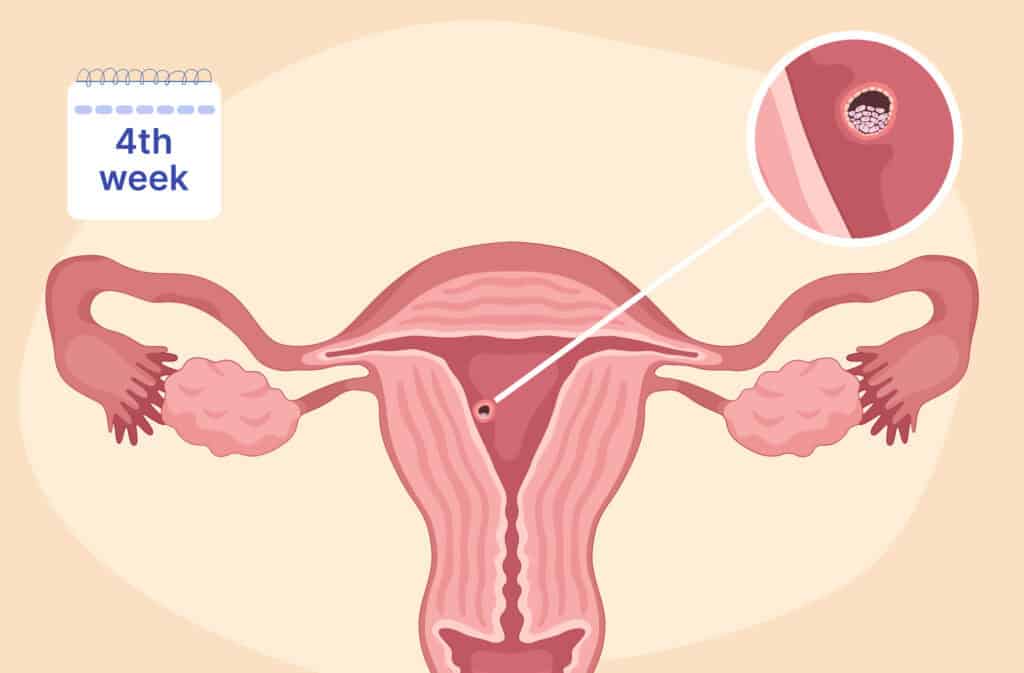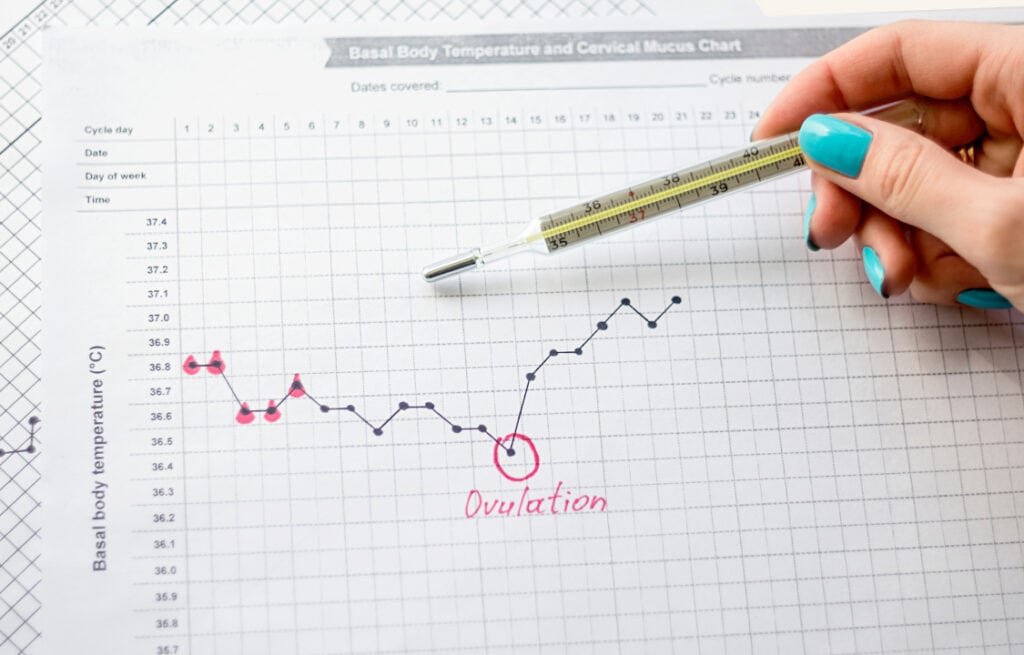Femia > Health Library > Pregnancy > Pregnancy week by week > 4 Weeks pregnant: Symptoms, fetal size, and health tips
4 Weeks pregnant: Symptoms, fetal size, and health tips

- Updated Feb 10, 2025
- Published
CRAFTED BY HUMAN
Crafted by human At Femia, we provide accurate and up-to-date information at every stage of your journey, from trying to conceive, pregnancy and postnatal support. All content is created by a real person based on in-depth research and own professional experience. Femia ensures that you will receive expert advice, strict accuracy and a personalized approach from our authors/medical experts. Learn more about our editorial policy.
FACT CHECKED
Fact checked At Femia Health, we maintain the highest standards of editorial excellence in delivering content focused on helping you conceive, guiding you through pregnancy, and supporting you postpartum. Explore our content review principles to learn how we ensure the accuracy and quality of our health and lifestyle tips for every stage of your journey.
At 4 weeks pregnant, the embryo is implanting or has recently completed implantation into the uterine lining. Early symptoms like fatigue, mild cramping, and breast tenderness may begin to appear. This is often the first week when pregnancy can be confirmed, making it an ideal time to start prenatal vitamins and focus on a healthy lifestyle.
At 4 weeks pregnant, exciting changes are beginning to unfold. This is typically the week when many people discover they’re pregnant, as hormone levels—specifically human chorionic gonadotropin (hCG)—are now detectable in the body. The ability to confirm pregnancy depends on the hCG levels and the sensitivity of the home pregnancy test used. The fertilized egg has implanted in the uterine lining, marking the start of rapid embryonic development.
With Femia, you will get personalized insights every step of the way
4-week pregnancy symptoms
During week 4 of pregnancy, symptoms may become more noticeable due to rising hormone levels, particularly progesterone and hCG. Here’s what you might experience:
- Mild cramping and spotting: Known as implantation cramping, light spotting or mild cramping can occur as the embryo embeds itself in the uterine lining.
- Fatigue: Hormonal changes, especially increased progesterone, may cause extreme tiredness, making rest essential at this stage.
- Breast tenderness and swelling: The surge in hormones can lead to breast changes, including tenderness and fullness. While some people may experience darkening of the areolas later in pregnancy, this pigmentation change is less common at this early stage.
- Nausea: Some people may experience mild nausea, though it’s more common around weeks 5-6 as hCG levels rise.
- Increased discharge: You may notice a slight increase in clear or white discharge, a typical response to hormonal changes.
👉Find out more: 3 Weeks pregnant: Symptoms, body changes, and fetal development
Your body at 4 weeks pregnant
In week 4, your body works hard to support the newly implanted embryo. Progesterone levels increase to maintain the uterine lining, while hCG (human chorionic gonadotropin) hormones signal the body to prevent the shedding of the uterine lining.
4-week pregnant belly
At 4 weeks, there are typically no visible changes in your belly, although some people might feel mild bloating. This is due to hormonal shifts rather than physical growth of the uterus, which will become noticeable in the coming weeks.
Baby development at 4 weeks pregnancy
By week 4, the fertilized egg has transformed into a blastocyst and successfully implanted in the uterus. This marks the beginning of embryonic development, with cells starting to differentiate into structures that will form the baby and placenta.
4-week fetus size
At this stage, the embryo is approximately the size of a poppy seed. It is still microscopic but rapidly growing as cells multiply and begin forming the foundation of vital systems.
4-week ultrasound
While an ultrasound at 4 weeks might not show the embryo yet, it can confirm the thickening of the uterine lining and occasionally detect the early gestational sac. Typically, pregnancy is confirmed via ultrasound around weeks 5-6 for better visibility of the embryo.
4-week progesterone levels in early pregnancy
Progesterone levels are crucial for supporting early pregnancy, and at week 4, they generally range between 9-47 ng/mL. These levels help maintain the uterine lining and support the developing embryo.
👉Find out more:
5 Weeks pregnant: A sneak peek into early baby development and symptoms
Health tips and self-care at 4 weeks pregnant
- Start prenatal vitamins: If you haven’t already, begin taking prenatal vitamins with folic acid to support fetal development.
- Stay hydrated and rested: With fatigue setting in, ensure you’re drinking enough water and getting sufficient sleep to support your body’s changes.
- Eat a balanced diet: Include nutrient-dense foods like vegetables, lean proteins, and whole grains to nourish your body and your growing baby.
With Femia, you will get personalized insights every step of the way
Questions from the Femia community
Which shots are safe during pregnancy?
The flu shot and Tdap are typically safe during pregnancy, but it’s best to consult your OB-GYN for specific vaccines.
What medications are safe?
Many over-the-counter medications should be avoided, so check with your healthcare provider about any prescriptions or OTC drugs you’re currently using.
When should I schedule my first prenatal appointment?
Most healthcare providers recommend scheduling your first prenatal visit between weeks 6 and 8 for an initial health assessment.
What foods should I avoid at 4 weeks pregnant?
Avoid raw fish, high-mercury seafood, unpasteurized dairy, and deli meats to reduce the risk of infection and mercury exposure.
The bottom line
At 4 weeks pregnant, early symptoms like fatigue, mild cramping, and breast tenderness may appear as your body adapts to support the developing embryo. While physical changes may be minimal, internally, hormone levels are rapidly rising. This is an ideal time to start prenatal care, including vitamins and a balanced diet, to support a healthy pregnancy foundation. Using a pregnancy-tracking app can help you monitor your progress and early pregnancy symptoms.
References
- “4 Weeks Pregnant: Symptoms & What to Expect.” NHS, www.nhs.uk/start-for-life/pregnancy/week-by-week-guide-to-pregnancy/1st-trimester/week-4/.
- “Week 4 of Pregnancy: Symptoms and Baby Development.” What to Expect, www.whattoexpect.com/pregnancy/week-by-week/week-4.aspx.
- “Progesterone Blood Level.” ScienceDirect, www.sciencedirect.com/topics/biochemistry-genetics-and-molecular-biology/progesterone-blood-level.
- “4 Weeks Pregnant: Baby Size, Symptoms, and Tips.” KidsHealth, www.kidshealth.org/en/parents/week4.html.
- “4 Weeks Pregnant: Symptoms & Baby Development.” BabyCenter, www.babycenter.com/pregnancy/week-by-week/4-weeks-pregnant.
- “4 Weeks Pregnant: What to Expect.” American Pregnancy Association, www.americanpregnancy.org/healthy-pregnancy/week-by-week/4-weeks-pregnant/.

Wondering if ovulation pain means you’ve missed your chance to conceive? Learn about the timing of ovulation pain, conception possibilities, and what it means for pregnancy.

Discover how to sync your diet with your menstrual cycle phases. Learn about the best foods for each phase to optimize energy, mood, and overall well-being.

Boost your fertility naturally with essential supplements and a balanced diet. Learn about CoQ10, Omega-3, Vitamin D, and other crucial nutrients for reproductive health.

